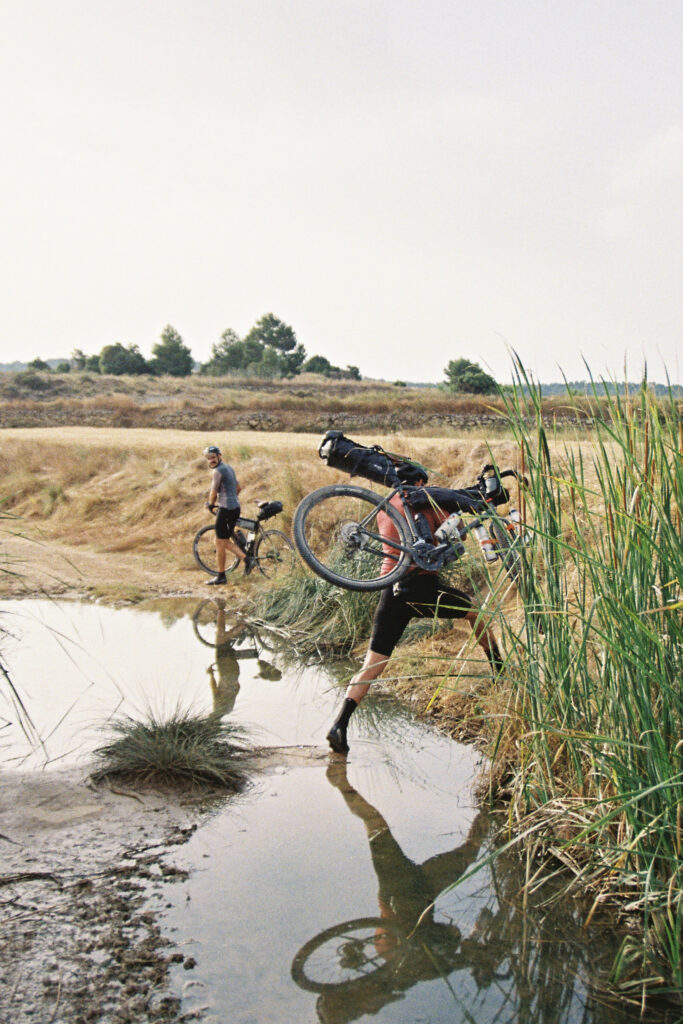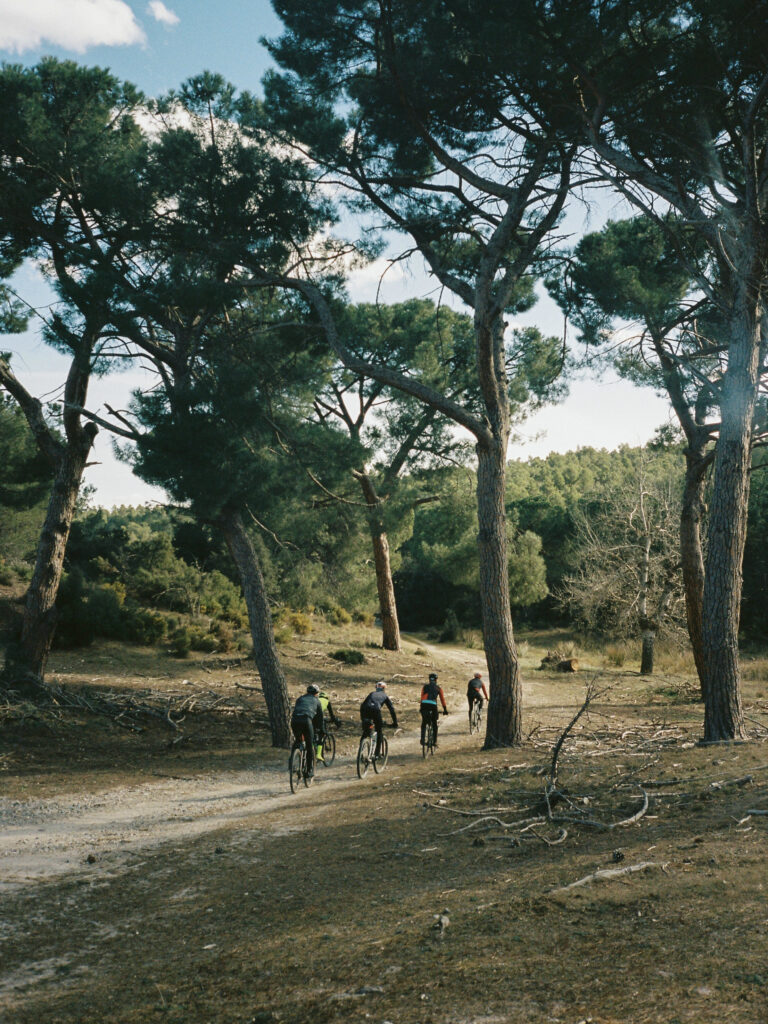ABOUT US
- adj. Belonging to or relating to or serving the wheel.
- n. disuse. At the printer’s, person who was in charge of moving the wheel of the machines.
- n. A mark or line left on the ground by the wheels of a vehicle that has moved over it.
- n. Path opened by the passage of the carts through the fields.
Rodera refers at the same time to the one that moves the wheel, as well as to the groove that it leaves imprinted on the track. Both to the wheel itself, and to the paths that it draws on the ground. Rodera defines us as cyclists and at the same time talks about the indelible mark that every trip leaves on ourselves. A groove sometimes visible to those who come after, but which always defines our own path in life. All that means Rodera and our way of understanding bikepacking.
This project was born mainly with the aim of rediscovering our own territory through the bicycle, as a personal exercise of working on the creation of a route that would allow us to connect those mountains, towns and places that seemed to us especially genuine and representative of the Valencian territory. The seemingly simple exercise of trying to link all those little dots on the map simply turned out to be impossible. Furthermore, the exercise of beginning this investigation very soon generated a growing list of places of interest. For this reason, the idea soon evolved towards trying to generate a network of routes and links. Links not only between themselves, but also with other routes around the Valencian territory such as Montañas Vacías, Burrally and Altravesur to name a few.
Another of the backbones of this project is also the need to return. Return understood as a mutual gesture with the cycling community, as our contribution from these latitudes to a growing group of related projects that are emerging little by little elsewhere. Just as we enjoy pedaling routes that others plan and allow us to discover their territories, we want Rodera to be a tool to facilitate that discovery for other cyclists. Bringing to this territory a slow-paced, self-guided and self-organized bike touring philosophy, which we have enjoyed in other corners and which we wanted to develop here. An act of reciprocity.
And given the scale of the project, and in order not to overwhelm ourselves with the huge work that this implies, we are going to go step by step, starting with a couple of independent routes. And later we will reveal its links, extensions and ramifications.
In addition, we do not want to lose sight of the open and inclusive nature that we seek in this project. We will try to give the information as clearly as possible and make it easy for everyone to organize their loops and sections adapted to their time availability, their level and their experience. Besides the information available on the web, we will publish a guide for each of the routes so that you can download it and take it with you during your trip. And, as far as possible, we will pay attention to your questions to help you with the organization.
Our region is long and narrow, but we are fortunate to have a certain advantage thanks to a network of local and regional trains that is still active. Although not all our routes are circular, it is easy to do small sections independently and without the need for private support vehicles. We believe in train-bike intermodality and we would like to encourage you to make use of it. Our territory allows it to a large extent and makes it easy to dispense with the use of private vehicles.
Finally, we would like to explain in which spectrum of the bikepacking panorama this project is situated. Iberian bikepacking has mainly crystallised in its competitive aspect. It has generated a myriad of events of a competitive nature, with a time limit and a short duration. Although we have participated in some of them and will continue to do so, it is a format that we think is quite exclusive in terms of gender and class and has an impact on the territory that is not always sustainable.
Little by little, however, other non-competitive routes are opening up on the peninsula, following in the wake of Montañas Vacías. Open in space and time, these initiatives seem to us to be very interesting in terms of the wide range of audiences and different profiles at which they are aimed. As well as the positive and prolonged impact they can have on the local area, they also have less of a draining effect in urban centers. This is at least our intention and the direction in which we want to work.
ABOUT US
- adj. Belonging to or relating to or serving the wheel.
- n. disuse. At the printer’s, person who was in charge of moving the wheel of the machines.
- n. A mark or line left on the ground by the wheels of a vehicle that has moved over it.
- n. Path opened by the passage of the carts through the fields.
Rodera refers at the same time to the one that moves the wheel, as well as to the groove that it leaves imprinted on the track. Both to the wheel itself, and to the paths that it draws on the ground. Rodera defines us as cyclists and at the same time talks about the indelible mark that every trip leaves on ourselves. A groove sometimes visible to those who come after, but which always defines our own path in life. All that means Rodera and our way of understanding bikepacking.
This project was born mainly with the aim of rediscovering our own territory through the bicycle, as a personal exercise of working on the creation of a route that would allow us to connect those mountains, towns and places that seemed to us especially genuine and representative of the Valencian territory. The seemingly simple exercise of trying to link all those little dots on the map simply turned out to be impossible. Furthermore, the exercise of beginning this investigation very soon generated a growing list of places of interest. For this reason, the idea soon evolved towards trying to generate a network of routes and links. Links not only between themselves, but also with other routes around the Valencian territory such as Montañas Vacías, Burrally and Altravesur to name a few.
Another of the backbones of this project is also the need to return. Return understood as a mutual gesture with the cycling community, as our contribution from these latitudes to a growing group of related projects that are emerging little by little elsewhere. Just as we enjoy pedaling routes that others plan and allow us to discover their territories, we want Rodera to be a tool to facilitate that discovery for other cyclists. Bringing to this territory a slow-paced, self-guided and self-organized bike touring philosophy, which we have enjoyed in other corners and which we wanted to develop here. An act of reciprocity.

In addition, we do not want to lose sight of the open and inclusive nature that we seek in this project. We will try to give the information as clearly as possible and make it easy for everyone to organize their loops and sections adapted to their time availability, their level and their experience. Besides the information available on the web, we will publish a guide for each of the routes so that you can download it and take it with you during your trip. And, as far as possible, we will pay attention to your questions to help you with the organization.
Our region is long and narrow, but we are fortunate to have a certain advantage thanks to a network of local and regional trains that is still active. Although not all our routes are circular, it is easy to do small sections independently and without the need for private support vehicles. We believe in train-bike intermodality and we would like to encourage you to make use of it. Our territory allows it to a large extent and makes it easy to dispense with the use of private vehicles.
Finally, we would like to explain in which spectrum of the bikepacking panorama this project is situated. Iberian bikepacking has mainly crystallised in its competitive aspect. It has generated a myriad of events of a competitive nature, with a time limit and a short duration. Although we have participated in some of them and will continue to do so, it is a format that we think is quite exclusive in terms of gender and class and has an impact on the territory that is not always sustainable.
Little by little, however, other non-competitive routes are opening up on the peninsula, following in the wake of Montañas Vacías. Open in space and time, these initiatives seem to us to be very interesting in terms of the wide range of audiences and different profiles at which they are aimed. As well as the positive and prolonged impact they can have on the local area, they also have less of a draining effect in urban centers. This is at least our intention and the direction in which we want to work.
In addition, we do not want to lose sight of the open and inclusive nature that we seek in this project. We will try to give the information as clearly as possible and make it easy for everyone to organize their loops and sections adapted to their time availability, their level and their experience. Besides the information available on the web, we will publish a guide for each of the routes so that you can download it and take it with you during your trip. And, as far as possible, we will pay attention to your questions to help you with the organization.
Our region is long and narrow, but we are fortunate to have a certain advantage thanks to a network of local and regional trains that is still active. Although not all our routes are circular, it is easy to do small sections independently and without the need for private support vehicles. We believe in train-bike intermodality and we would like to encourage you to make use of it. Our territory allows it to a large extent and makes it easy to dispense with the use of private vehicles.
Finally, we would like to explain in which spectrum of the bikepacking panorama this project is situated. Iberian bikepacking has mainly crystallised in its competitive aspect. It has generated a myriad of events of a competitive nature, with a time limit and a short duration. Although we have participated in some of them and will continue to do so, it is a format that we think is quite exclusive in terms of gender and class and has an impact on the territory that is not always sustainable.
Little by little, however, other non-competitive routes are opening up on the peninsula, following in the wake of Montañas Vacías. Open in space and time, these initiatives seem to us to be very interesting in terms of the wide range of audiences and different profiles at which they are aimed. As well as the positive and prolonged impact they can have on the local area, they also have less of a draining effect in urban centers. This is at least our intention and the direction in which we want to work.

